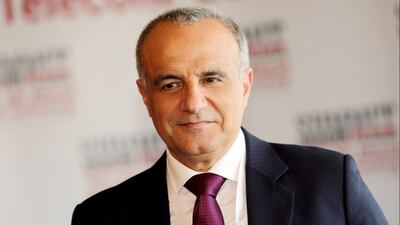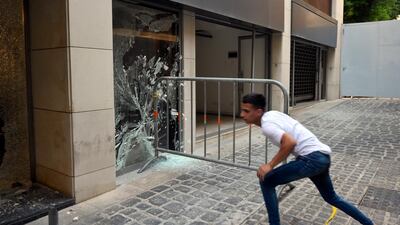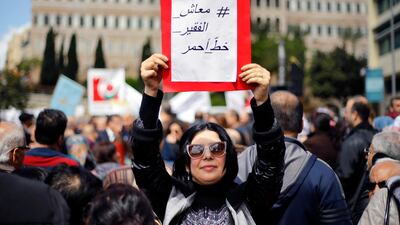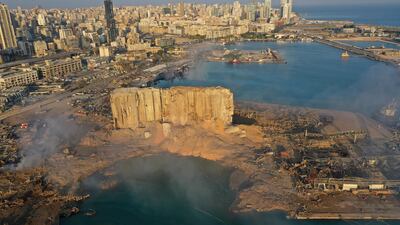Sustained power-rationing will soon cause "disastrous" large-scale internet outages in Lebanon that could cripple the central bank, the economy and vital infrastructure from hospitals to schools, the head of state-owned telecoms operator Ogero told The National as he warned that services were crumbling under the weight of the ongoing crisis.
Company chairman, Imad Kreidieh, said, "only God knows," how long until there are severe internet outages.
“In the event of a power cut, everything will eventually freeze,” Mr Kreidieh said, warning of the “disastrous” impact internet outages will have.
“The central bank’s system will stop operating. Hospitals, schools, universities and businesses with overseas clients will all be affected … It will be the final nail in the coffin for the Lebanese economy.”
For decades, Lebanon has struggled with power cuts that increased after a Turkish company that runs power barges generating around a third of the country’s supply said in May it was ending operations due to unpaid bills and legal challenges.
Mr Kreidieh said there were a number of factors to maintaining a stable internet service, including whether state-owned power company Electricite du Liban could boost production as well as the availability of diesel to power backup generators.
“If these are missing, then we will have a problem very soon,” he said, but added that it doesn't mean the outages will happen immediately.
EDL has been increasingly rationing its power supply since the economic crisis began in late 2019 and now provides less than six hours of electricity a day in many areas of the country.
Meanwhile, the national currency has lost over 85 per cent of its market value, trading at over 13,000 pounds to the dollar as opposed to the 1,515 official rate.
The situation was compounded by the massive blast that struck Beirut last August, killing over 200 people and destroying thousands of properties across the capital.
The government resigned after the explosion and is yet to be replaced nine months later due to a political deadlock plunging the country into paralysis that has exacerbated foreign currency shortages.
The central bank is running short on foreign currency reserves and is rationing imports at the official rates – meaning fuel, medicines and other goods and equipment are in short supply.
Pharmacies have run out of even basic over-the-counter drugs and petrol stations have closed since running dry.
Private generators, who compensate for state power rationing, are now also cutting supply by up to five hours per day due to diesel shortages.
Ogero has sought temporary fixes to power cuts – buying additional generators to keep internet relay stations running – but this is costly and, Mr Kreidieh says, unsustainable.
“What’s the use of buying a generator if you can’t purchase diesel to turn it on,” he said.
Ogero has been looking at installing solar panels to power some stations, but Mr Kreidieh said the process has proved challenging due to space and funding constraints.
He called on Lebanese officials to take swift action to enable Ogero and the Telecom Ministry to avert the crisis and said he was sounding the alarm to make sure people know what could be coming.
“I don’t believe it’s wrong to warn people so they’re not caught by surprise if they wake up one day without internet,” he said, adding that it was not just the internet that would shut down.
That was evident on Monday when several water establishments – the state-affiliated bodies tasked with managing water supply to households – announced that their pumps were being shut down due to a lack of diesel to power backup generators.
The fuel shortage prompted Lebanon's Finance Ministry on Monday to officially request the central bank finance $200 million in fuel purchases at the official exchange rate.
On top of fuel shortages, Ogero is facing other challenges, Mr Kreidieh said.
The telecom operator is struggling to get new imported equipment to maintain its networks or enrol new subscribers as the national currency continues to plummet, he said.
Such imports, along with the cost of connecting Lebanon to the World Wide Web through high capacity submarine cables, are paid for in US dollars at the market rate while Ogero collected its bills in Lebanese pounds, Mr Kreidieh added.
“We are turning a productive sector into one that will definitely suffer deficits, like various other sectors, if tariffs are not amended,” he said.
This has been the case with the state-owned power company which has cost the treasury $1.5-$2 billion in recent years with bills not covering electricity production costs.
The telecom sector, on the other hand, used to generate up to $1 billion in revenue for the state coffers until 2017.
It is the government that must make the decision to hike tariffs, Mr Kreidieh said.
He estimates Ogero’s funding shortfall for 2021 will be close to $20 million dollars.
He said that the telecom operator’s budget for maintenance and operations remains unchanged from 2019 at around 60 trillion Lebanese pounds. This would be $40 million at the official rate but is now worth less than $5 million at the market rate.
The pound's plummeting value is also posing other challenges for Ogero.
Mr Kreidieh says the telecom operator has lost over 100 mostly young staff members due to the country’s crisis.
Even so, he said, Ogero is pushing forward, albeit at a slower pace, with their plan to roll out fibreoptic cables and speed up one of the world’s slowest internet networks.
The four-year project, launched in October 2018, came to a halt just over a year later before resuming in 2021, Mr Kreidieh said.
“Despite financing difficulties, Ogero has been adding 1,500 to 1,600 new subscribers to the fibre optic network per month,” Mr Kreidieh said.
To finish off the network, however, he says Ogero needs to find around $80 million.




















